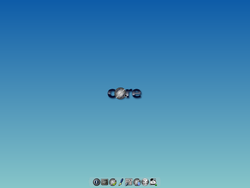Tiny Core Linux
 | |
 Tiny Core Linux 5.x | |
| Working state | Current |
|---|---|
| Source model | Open source |
| Latest release | 6.3 [1] / May 30, 2015 |
| Latest preview | n/a |
| Available in | English |
| Package manager | appbrowser (GUI) / tce (CLI) |
| Platforms | x86, x86-64, armv7, Raspberry Pi |
| Kernel type | Monolithic |
| Userland | BusyBox |
| Default user interface | FLWM |
| License | GPL v2 License[2] |
| Official website | tinycorelinux |
Tiny Core Linux (TCL) is a minimal Linux operating system focusing on providing a base system using BusyBox and FLTK, developed by Robert Shingledecker.[3] The distribution is notable for its size (15 MB) and minimalism, with additional functionality provided by extensions. Tiny Core Linux is free and open source software and is licensed under the GNU General Public License version 2.
Types of "Cores"
"Tiny Core" (15 MB) is the recommended option for new users who have a wired network connection. It includes the base Core system and a dynamic FLTK/FLWM graphical user interface.[4]
"Core" (9 MB) (also known as "Micro Core Linux") is a smaller variant of Tiny Core without a graphical desktop, though additional extensions can be added to create a system with a graphical desktop environment.[4]
"dCore" (10 MB) is a core made from Debian Wheezy compatible files that uses import and the SCE package format,[5] the new generation self-contained package format for the Tiny Core distribution since 5.x series.
"CorePure64" is a notable port of "Core" to the x86_64 architecture. Currently there is no released ISO image, but the kernel and initrd are available for download at the "ports" page of the official site.
"Core Plus" (72 MB) is "an installation image and not the distribution".[4] It is composed of Tiny Core with additional functionality, most notably wireless support and non-US keyboard support.[4]
"piCore" is the Raspberry Pi port of "Core"
System requirements
Minimal configuration: Tiny Core needs at least 46 MB of RAM in order to run, and Core requires at least 28 MB of RAM. The minimum CPU is an i486DX.[6]
Recommended configuration: A Pentium 2 CPU and 128 MB of RAM are recommended for Tiny Core.[6]
Design philosophy
The developers describe TCL as "a nomadic ultra small graphical desktop operating system capable of booting from cdrom, pendrive, or frugally from a hard drive."[7] As of version 2.8.1, the core is designed to run primarily in RAM but with three distinct modes of operation:
- "Cloud" or Internet mode — A "testdrive" mode using a built-in appbrowser GUI to explore extensions from an online application extension repository loaded into RAM only for the current session.
- TCE/Install — A mode for Tiny Core Extensions downloaded and run from a storage partition but kept as symbolic links in RAM.
- TCE/CopyFS — A mode which installs applications onto a Linux partition like a more typical Linux installation.[8]
Release history
| Version | Stability | Release date |
|---|---|---|
| 1.0 [9] | Stable version | January 5, 2009 |
| 2.0 [9] | Stable version | June 7, 2009 |
| 3.0 [9] | Stable version | July 19, 2010 |
| 4.0 [9] | Stable version | September 25, 2011 |
| 4.7.7 [9] | Stable Version | May 10, 2013 |
| 5.0 [9] | Stable Version | September 14, 2013 |
| 5.0.1 [9] | Current Release | October 1, 2013 |
| 5.0.2 [9] | Current Release | October 18, 2013 |
| 5.1 [9] | Current Release | November 28, 2013 |
| 5.2 [9] | Current Release | January 14, 2014 |
| 5.3 [9] | Current Release | April 19, 2014 |
| 5.4 [9] | Current Release | September 10, 2014 |
| 6.0 [9] | Current Release | January 5, 2015 |
| 6.1 [9] | Current Release | March 7, 2015 |
See also
- Comparison of Linux live distributions
- Lightweight Linux distribution
- List of Linux distributions that run from RAM
- Telikin
References
- ^ "Tiny Core v6.1". Tiny Core Linux Forum. Retrieved March 7, 2015.
- ^ Robert Shingledecker. "Frequently Asked Questions: License". Retrieved June 6, 2012.
- ^ "Robert Shingledecker's Projects". Retrieved June 6, 2012.
- ^ a b c d Robert Shingledecker (2012). "Downloads - Tiny Core Linux". Retrieved September 13, 2012.
- ^ Juanito. "dCore-5.0.alpha1 released". Retrieved May 30, 2013.
- ^ a b Robert Shingledecker. "Frequently Asked Questions: What are the minimum requirements?". Retrieved September 13, 2012.
- ^ Robert Shingledecker (December 1, 2008). "Welcome to The Core Project - Tiny Core Linux". Retrieved June 6, 2012.
- ^ Robert Shingledecker. "Tiny Core: Core Concepts". Retrieved June 6, 2012.
- ^ a b c d e f g h i j k l m n Final Releases – Release Announcements and Change log from Tiny Core Linux Forum
External links
- Official website
- Tiny Core Linux at DistroWatch
- "Interview with Robert Shingledecker, creator of Tiny Core Linux". DistroWatch Weekly (295). March 23, 2009. Retrieved September 13, 2012.
- Ferrill, Paul (March 19, 2009). "Tiny Core Linux -- A Minimal Distro with Big Possibilities". LinuxPlanet. Retrieved September 13, 2012.
- "Tiny Core Linux Wiki". Retrieved September 13, 2012.
- Bernard, Joey (Sep 1, 2011). "Tiny Core Linux". Linux Journal. Retrieved September 13, 2012.
- "Tiny Core 4.5.....Almost In Love With A Core.!!". YouTube. Retrieved September 13, 2012.
